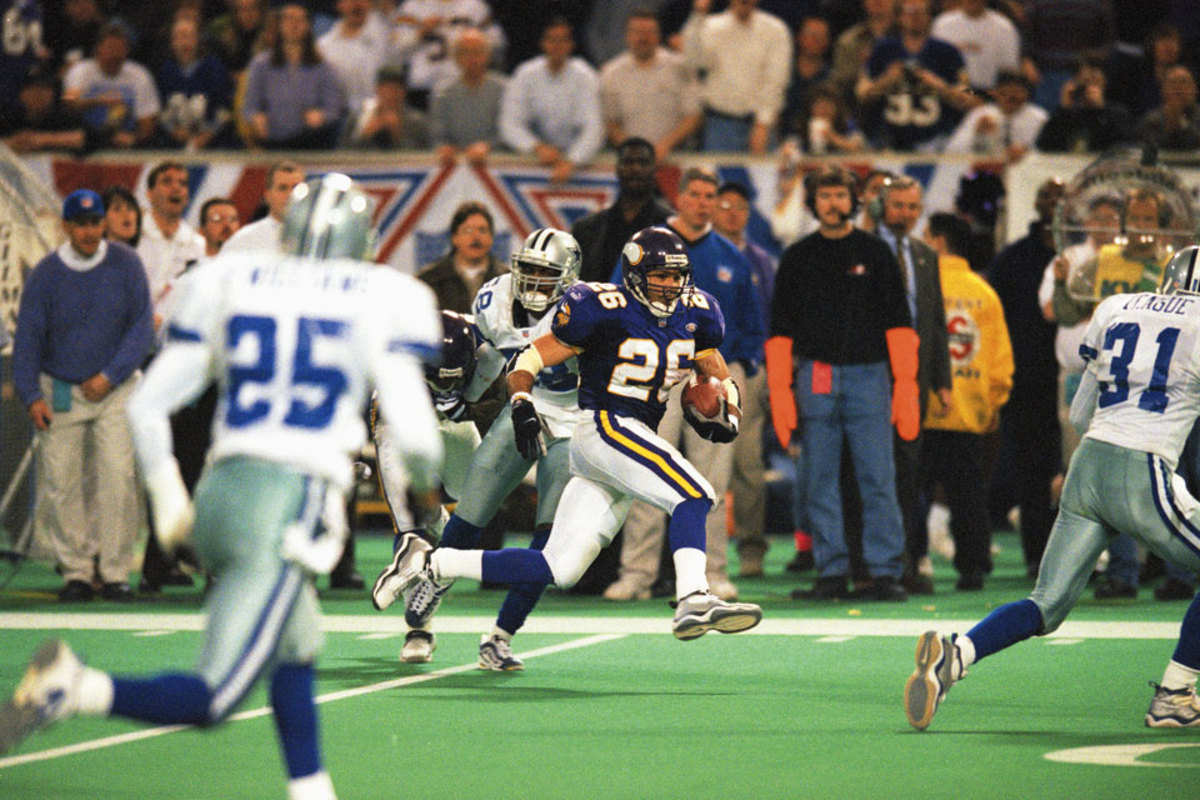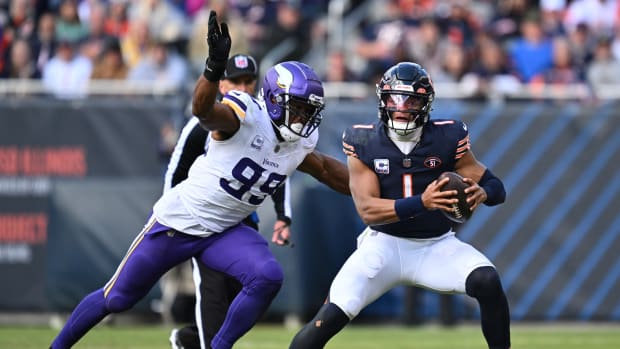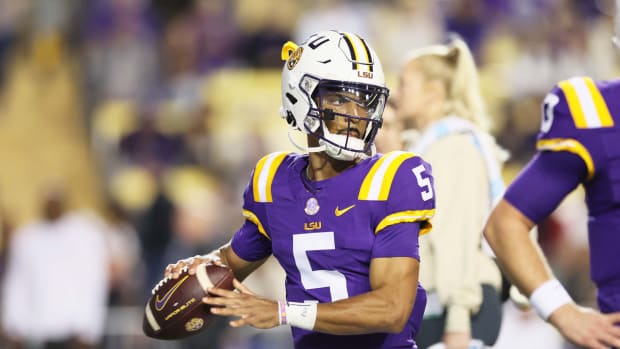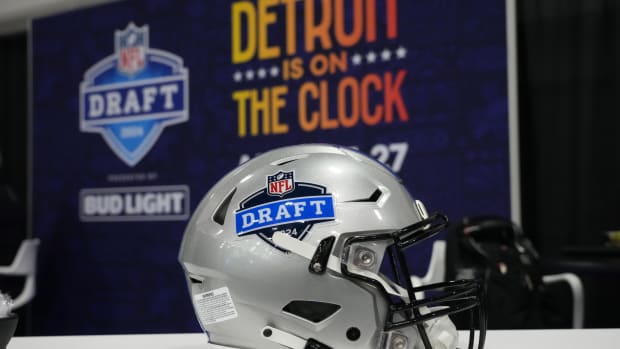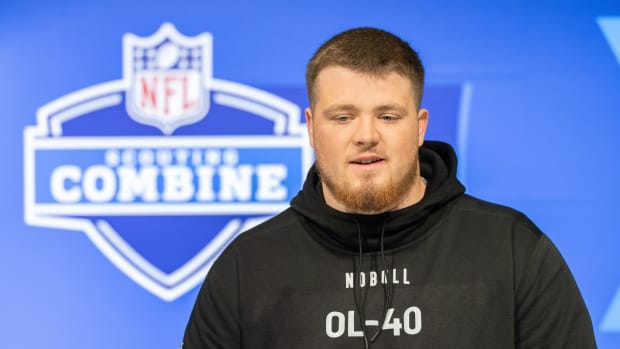‘I’d Rather Walk Away Early Than Limp Away Late’
Fourteen years ago last month, the surprise retirement saga in the NFL belonged to Vikings running back Robert Smith, the game-breaking eighth-year veteran who stepped away from football at age 28, fresh off a career-best season in 2000. That year Smith led the NFC with 1,521 rushing yards and for the first time played in all 16 games for a talented division-winning team that advanced to the NFC Championship Game, where it lost in a blowout to the New York Giants.
Smith was long considered one of the most thoughtful and enlightened players of his era and always counted issues relating to health and science to be among his life’s passions. At one point in his collegiate career at Ohio State, he was a pre-med major who foresaw a post-football future in medicine, and he retains a strong interest in health care and preventative medicine to this day.
When he chose to exit the NFL, Smith was slated to become a free agent in March 2001, with the expectation of eliciting a contract offer projected to be worth $20 million to $40 million. But Smith, now 43, never chased that money and quietly announced his retirement via email, explaining that he valued the ability to live a normal, pain-free lifestyle in the coming years far more than he did another monster NFL payday. To this day he still holds the league’s career record for the longest average touchdown run (27.2 yards on 32 rushing scores).
With the abrupt and health-conscious retirement of 49ers first-year linebacker Chris Borland stunning the league this week, I spoke with Smith on Wednesday to get his thoughts about Borland’s surprising and impact-laden decision, and to take a retrospective look at Smith’s choice to leave the game in his prime, when so few professional athletes manage to make a departure on their own terms.
BANKS: What was your initial reaction to hearing the news of Borland’s retirement after just one season in the NFL, and his explanation that he no longer thought the risks of potential brain injury were justified?
SMITH: I don’t know Borland, but he is represented by the same agent, Neil Cornrich, who represented me throughout my playing career. So we have that in common. From all indications, and this is just my take on things, I think Chris Borland enjoyed playing. But I think he knows what kind of commitment an NFL career was going to be, and quite frankly with the way he plays the game, there is only one way to do it. I just don’t think he wanted to stop at some other point. I don’t think he wants to make the commitment to play the game and do it the way it needs to be done, because if it’s done the way it needs to be done, then he might not be able to turn it off at some later point. That’s the way it seems to me looking at his situation.
More on Chris Borlandu2019s Retirement
A roundtable of nine NFL players offering insight into Borland’s sudden departureEx-linebacker Scott Fujita nearly walked away because of concussion concerns but couldn’t ‘get off the hamster wheel.’ His perspective on Borland’s bold decisionThe ripple effects of how Borland’s retirement at 24 will affect youth football
BANKS: It’s not an apples to apples comparison, because you were 28 and had played eight seasons in the league, but you walked away while you were still one of the game’s best running backs, drawing comparisons to Jim Brown and Barry Sanders. Can you relate to Borland’s decision, because just as you did, he caught a lot of people off guard and based his decision on the quality of his post-football lifestyle?
SMITH: Looking back at it, the reason people were so surprised was because they didn’t really know what was going on. My last season was the only season of my career I didn’t miss any games, and I still needed knee surgery after the year. When I tore my [right] ACL in ’93 [as a Vikings rookie], it wasn’t just a simple ACL tear. I broke the bottom of the femur and I believe that did some damage to the articular surface, and when that happens you can fray the meniscus easier, and you start getting those patches up there so that it’s an uneven surface. There isn’t a smooth sliding anymore.
Then after the ’98 season I had to have a microfracture surgery on that knee. And then after the 2000 season I had to have a microfracture on that knee, so that knee was wearing down. I had both of those microfractures after the ACL, and it’s the same knee.
It’s funny because with all this retirement news lately, with Patrick Willis a couple weeks ago and Jason Worilds, all this is going on and literally I’m sitting in the doctor’s office scheduling another knee surgery on my right knee. I got out because I didn’t want to be a 45-year-old knee-replacement guy, and that’s what I would have been. And everything that’s going on right now is just confirmation that that’s true. What’s going on with my knee now, I can’t imagine if I had played longer. It would have been shredded.
BANKS: So 14 years into your retirement, what is going on with your knee?
SMITH: I have to have the medial and lateral meniscus repaired. The ACL construction has come loose to a degree, but they tighten them up to a degree beyond what would naturally occur. They’re not concerned about the knee, it’s stable. At Ohio State just last week, they did the first artificial meniscus implant, so I may be a candidate for that if it comes to that at some point. But it’s nothing severe that I deal with. I’m running around with the kids, my 3- and 5-year-olds, jumping on the trampoline with them, so I’m pretty happy with that.
BANKS: Hearing how much Borland did his homework and his research on brain injuries and tried to come to a well-considered decision about his playing future, did that remind you of yourself circa early 2001, trying to take yourself out of the well-paying moment and thinking about life beyond football?
SMITH: Oh, absolutely, and I think that consideration was always there with me, that I’d rather walk away early than limp away late. It just doesn’t make any sense to push it further than you want to push it. Especially at our positions, because I think linebacker and running back are the two most dangerous positions in the game.
BANKS: Why do you say that? Because of the collision factor?
SMITH: It’s not just the collision factor, it’s the amount of distance that you move by the time you absorb the contact. Obviously on the offensive and defensive lines you have more contact, but it’s short-distance contact and you don’t get hit in the open as much—and you don’t get hit from as many angles simultaneously as you do at linebacker and running back. At linebacker you’re in more free space, you’re moving anywhere from five to six or even eight to 10 yards to make a play. You’ve got safeties coming down behind you, and you’ve got linemen coming back at you in front of you.
So you’ve got a lot of different angles where bodies are moving, and I think that’s what really gets you in the game, getting sandwiched. The straight-on hits don’t do it as much as those side impacts that you don’t anticipate, the twists and turns. And it’s the same thing that happens at running back. You look at the way that running backs and linebackers line up, and it’s almost exactly the same. We’re that same distance from the line, and you get that head of steam and you get up in there and twist, crack and all that fun stuff that happens.
Wouldn’t you pay anything to get your health back if you lost it? Why would you do anything continuously for any amount of money that gave you a very good chance of losing your health?
BANKS: Judging from your experience, how difficult is it to do what Borland did?
SMITH: Just thinking about what you want to do with your life long-term and getting past the game, that’s not easy. People just hear the numbers on the money available, and that’s just it. They can’t move past there, and I’ve had so many people say to me, ‘How could you pass up the kind of money you were in line for in free agency?’ And it’s true, I could have signed another big deal. But first of all, I had always made good money, and [my agent] Neil had done a really good job for me.
But by the same token, if you think about what happens to you and you think about your life, especially as you age, wouldn’t you pay anything to get your health back if you lost it? Why would you do anything continuously for any amount of money that gave you a very good chance of losing your health? I mean continually rolling the dice like that, it doesn’t make any sense to me and never did.
Smith relaxes on a visit to Germany for the 1993 American Bowl. (Bill Frakes/Sports Illustrated)
BANKS: Did any thoughts about ending your career so early ever have anything to do with the potential for brain injury? Was that ever one of your considerations?
SMITH: None. Absolutely none. That really wasn’t a story then. It’s not something that was on anybody’s radar. I know people say the league knew, but the league is not a research institution. And people will say they had research saying this and that, but there was research on a lot of different things. [Former NFL defensive lineman and NFLPA president] Trace Armstrong did some work looking into improving our helmets, but that was just the helmets. It wasn’t looking at players and saying we’ve got this great long list of players suffering these long-term effects. There was no clear-cut evidence or straight line between, ‘Okay, he received long-term hits and now he’s suffering in later life.’ That’s just something that wasn’t really there then.
BANKS: How long did you grapple with retirement before coming to a decision? Was it weeks, months, years?
SMITH: The thought process was a couple years. After having knee surgery after the first year of a new five-year deal I signed [in 1998], I started thinking about it seriously. The last two years of that deal were voided because of performance incentives, so it really wound up a being a three-year contract that ended after 2000. After the first year of that deal I was starting to think this might not be the best thing to continue doing. But I enjoyed the game more than I ever thought I would, and those last year two years I just really enjoyed it. I just really enjoyed being around the team and being relatively healthy compared to the first four years of my career, and kind of demonstrating what I knew all along: that if I was healthy I could play this game pretty well.
But then after the 2000 season, it was like, ‘OK, my contract’s up, and I’ve pretty much proven my point.’ I had become the team’s alltime leading rusher [a mark since surpassed by Adrian Peterson], and I had done what many people said I wouldn’t be able to do, which is play at the highest level and play healthy. The contract was up, and I certainly didn’t want to go play for another team. I didn’t want to have to come back after signing a new deal and then play a year and be done. It was important to me to finish the contract. It felt a lot cleaner to walk away with the deal being done.
BANKS: Borland said he wanted to be proactive, and if he waited for symptoms it could already be too late. Do you think the kind of approach he took to making this decision changes the dynamic at all regarding the risk-reward of playing in the NFL? Or is his story just a blip, and there will always be an endless supply of football talent to draw from?
SMITH: There’s a lot to this story. I think Borland, though, is an unusual case, because after exposing yourself to all the things that it takes to get to that level, then to play one year and say, ‘Well, OK, that’s it.’ I don’t think a lot of players are going to put themselves through what they have to do to get that point, just to get there and say, ‘OK, now, I’m done.’ I just don’t see that happening.
What’s going to happen, I believe, is there’s going to be more people on the other end of it that aren’t making the decision to play the game. There’s going to be athletes or parents who make that call. But I don’t think that necessarily robs or eliminates the necessary numbers the NFL needs. Still, it has to have some impact on the quality of talent, because there’s going to be some talented guys who choose to play other sports. Some of that probably already happens anyway; LeBron James could have probably played tight end in the NFL. There are those rare athletes who can play multiple sports who will just say there’s no reason for me to play football. It’s not worth the risk.
Smith had four straight 1,000-yard seasons before retiring at age 28. (John Iacono/Sports Illustrated)
BANKS: Ever come to regret the decision you made to retire so young?
SMITH: No, and it’s funny because everything that has happened has kind of really reinforced my decision, from hearing everything about head trauma in recent years to what’s happened with my knees. Having the kids and experiencing what I envisioned years ago, being able to play in a pain-free way with my kids, that’s my happiest possible scenario. It’s kind of all gone the way I’d hoped it would go.
BANKS: And did you feel that same way even when football season rolled around in 2001, your first year of retirement?
SMITH: I don’t think there’s any question I could have played more. But my knee was clearly wearing down. I felt great at the time, but some of that is youth and some of that is arrogance. Because if you look at what happened, I had two microfracture surgeries in three years, so clearly something was wearing down in that knee.
And you have to remember what happened that summer in 2001. That was when [former Ohio State and Vikings teammate] Korey [Stringer] died [of heat-related issues early in training camp]. So it was really tough. Part of me wished I was there, and part of me was glad that I didn’t have to see it. I was an absolute wreck at that time. I had so many mixed emotions about the decision I had made in relation to what happened with Korey that I can’t even separate the two. But I never regretted leaving. Because if I left for a good reason, it was still a good reason even as time passed.
BANKS: What’s the lesson you think will linger from Borland’s example?
SMITH: I know he’s not the last guy who will come to this decision, but I do think this is such a rare case, with him being so successful in his first year. I’m guessing that if guys thought it was worth hanging in there long enough to make the league, they’re going to at least want to play some and maybe get through one contract and maybe get some money before they make the decision to walk away. I don’t know that we’ll see this extraordinarily rare case again, where a guy will play only one really good year. Unless there’s something dramatic where they suffer some sort of serious injury.
Because I can tell you this: There’s a reason we send 18- and 19-year-olds to war, very young men. At that age, your mind just doesn’t operate the same way that it some day will. You think you’re invincible, especially when you’re that successful in the game of football. You have no idea the s--- I did off the field, because you really think you can do no damn wrong, and won’t suffer the consequences for the stupid s--- you do. Most guys on the field don’t think they’re going to have to suffer the consequences from playing the game either.
What I honestly hope Borland’s story does is kind of help get guys into a mindset earlier that they have to start thinking about what’s next. Because the end comes in a way that’s forced on most people, and most people aren’t ready for that.
• THE MMQB PODCAST: Andy Benoit on free-agency movement and the best backs in the 2015 draft
Follow The MMQB on Facebook, Twitter and Instagram.
[widget widget_name="SI Newsletter Widget”]
































